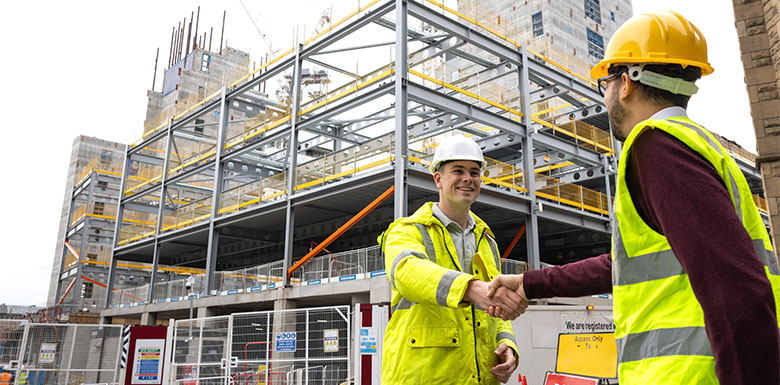How to start a construction company
 In this article
In this article
Whether you’re relatively new to the construction industry, or you have experience in the field, chances are you’ve already considered what it might look like to start a construction company of your own.
From learning how to run a business yourself to acquiring all the essential permits you’ll need to carry out your job, there’s a lot to consider, – which is why we’ve broken down everything you need to know about how to start a construction business.
Read on to discover the fundamental elements that go into starting a construction business, including funding, insurance, tools, and more, as well as how to market your business before and after you open.
Create a construction company business plan
When discussing how to start a construction company, one of the very first documents you need is your business plan. Designed to provide a clear outline of your business’s strategy, goals, funding, and more, your business plan will be your go-to document from day one.
Naturally, this means you’ll want to include as much detail as possible, including steps for the initial set-up of your business, as well as your intended contingency plans in case you fail to meet your goals or acquire your desired level of funding.
Below are the key pieces of information we recommend new construction businesses include in their business plan:
- Your business overview – A top-level description of your business, its mission, any USPs you have, the specific service areas you intend to operate in (domestic construction, commercial construction, etc.), and any other business details you feel are important to include.
- Your business goals – A list of what you hope to achieve with your business over a set period (such as 5 years), and how you intend to meet these goals.
- Contingency plans – An outline of the different contingency plans you have in case things don’t go to plan.
- Market research – A breakdown of who your target market is and the customers you want to work with, as well as who your competitors are, so you can get a good feel for the business landscape in your area before you start.
- Services and prices – An outline of the main services you plan to offer and their pricing. As a new construction company, you may want to focus on domestic housing work that doesn’t require large plant machinery. Or you may want to dive straight into large-scale construction projects should you have the experience. Just be sure to price your work fairly and in line with the labour and work hours required by you and your team.
- Business financing – An overview of how you plan to acquire your startup capital, your intended financial goals, income projections, and cash flow management.
- Marketing strategies – A detailed look at how you plan to market your business moving forward before getting your first jobs to ensure quick and steady growth once your business hits the ground.
- Regulatory knowledge – A section that shows you have a clear understanding of current and future construction regulations in order to show that you have the knowledge and experience needed to start and operate a construction company.
- Licensing knowledge – A detailed list of the potential permits you will require to operate within council and public areas.
Structuring your construction company
Alongside putting time aside to properly outline your business plan, you’ll need to think about how best to structure your business, and what your company name will be, and register these with HMRC. Registering your business with HMRC is a legal requirement, and you can’t operate without doing this.
As a construction company, you can establish yourself as a sole trader, partnership, or limited company. Each of these business structures comes with its own advantages and disadvantages, so you should do your research to see which one best matches your business vision.
On top of this, you’ll also need to sign your business up to the Construction Industry Scheme (CIS). Again, doing so is a legal requirement for construction businesses, as it relates to how payments are made and processed with regard to tax.
Financing your construction business
While your business plan should outline how you intend to finance your business initially, it’s important to think about who will handle your finances once your business is properly established.
Staying on top of your finances is crucial for keeping a new business afloat, and cash flow problems are often the main reason for new businesses failing. So, from overhead tracking to invoice follow-ups, make sure you keep detailed notes of all your income and outgoings to avoid being left in the red.
Of course, we know that finance management isn’t for everyone, so there’s no reason not to employ the assistance of a dedicated accountant if you’d rather have a trained professional manage your finances instead.
Deciding on business insurance
An often overlooked but fundamental element of starting any business, selecting the right builder insurance for your construction business will protect you, your reputation, and your finances against any unforeseen accidents that occur while working.
As for which business insurance you should pick, public liability insurance is a must, as is personal insurance. Vehicle and tool insurance is also very important to consider in case of theft. And if you employ staff, then you will be legally required to invest in employer’s liability insurance before they can begin work.
Staying CSCS certified
Having already worked in the construction industry for some time, you’re probably well aware of the importance of being CSCS certified (Construction Skills Certification Scheme) – much like signing up for the CIS, you will not legally be able to work on certain sites without this certification to hand.
Whether your current CSCS certification needs renewing or updating, take the time to confirm which variant of CSCS card you’ll need and take the appropriate steps to acquire it before you begin work.
What qualifications do I need to start a construction company?
In the unlikely event that you’re looking to start a construction business without any qualifications, it’s essential that you put the time in to acquire the qualifications needed to become a builder before you take any other steps towards building your business.
Simply put, customers are far less likely to trust or use a construction company which lacks the relevant qualifications to do the job at hand. Thus, in order to start a construction business, you should have a Level 1 and 2 Certification in Construction Skills or an NVQ qualification in construction work at a minimum.
Alternatively, if you already have your base construction qualifications, then it never hurts to acquire a recognised trade accreditation, such as a certification from the Federation of Master Builders, to act as further proof of your skills.
What tools do you need when starting a construction company?
When it comes to starting a construction company, you’ll naturally need all the essential tools of the trade so that you can consistently deliver a high standard of work.
Here is our must-have list of tools and equipment you should look to buy before starting your own construction company:
- A basic tool set (screwdrivers, pliers, wrenches, hammers, etc.)
- Ladders
- Drills
- A variety of essential construction saws
- Tape measures
- Spirit levels
- Building supplies
- Licenses for buying (or more likely hiring) large plant machinery
- Business vehicles for tool and equipment transportation
How to grow your construction company
While having all of the above points in place early on is necessary for starting your construction business, if you want your business to grow quickly, it's vital you think about marketing your construction company well in advance of your opening day.
We recommend trying some or all of the following marketing techniques before you look to land your first customers:
1. Build a business website
No matter what sort of business you operate, having a business website is a basic requirement for running a modern company. Without a website, customers will struggle to find you and you’ll likely lose out on numerous leads.
Fortunately, building a website doesn’t have to be complex or expensive. There are plenty of website builders out there that can create a simple and streamlined website for you – one that’s easy for customers to navigate and book your services without putting you over budget. Read our guide on how to build a small business website on a budget.
2. Get active on social media
Like your website, having an active social media presence can make a world of difference when it comes to acquiring new leads. From highlighting ongoing jobs step-by-step to showing off finished projects to potential clients (with the customer’s permission), social media can be a cornerstone of your marketing strategy.
For construction companies in particular, Facebook and Instagram are both excellent platforms to use, though TikTok can be a good choice if you want to share small DIY building hacks that customers can do themselves. Whatever the case, do not neglect this area of marketing when it comes to earning leads through word-of-mouth.
3. Get on Google reviews
Nowadays, online reviews are one of the most important aspects of online marketing to bear in mind. Having a healthy collection of positive Google reviews shows potential customers that you know what you’re doing and that you can be trusted to do good work, increasing the likelihood that new customers will choose to work with you in the future.
4. Invest in local marketing
Traditional local marketing methods might not be as prominent as they once were, but that doesn’t mean you can’t still use them as part of your overarching marketing strategy. Whether that’s through sending out leaflets, posting on local forums, or sponsoring local events, there’s plenty you can do to get your name out into your set work area.
At the very least, you should consider branding both your work uniform and vehicles with your company logos. This essentially acts as free advertising for you when you’re out working, and can help to establish you as a well-known presence in your local community.
5. Don’t neglect trade directories
It’s also a good idea to get your business registered on one of the various online trade directories out there – such as with the Which? Trusted Traders scheme.
Not only will this make you more accessible to customers, you’ll also be eligible for member benefits. Which? Trusted Traders has a rigorous vetting process in place to boost your business’s credibility and trustworthiness in the eyes of potential customers.
Signing up as a Which? Trusted Trader
You should now have a much better idea of how to start a construction business, and what areas of marketing to consider as you work your way towards opening day.
Of course, if you’re interested in giving yourself a head start over your competitors, then you might want to consider becoming a Trusted Trader today. Get in touch with our team to learn more about our vetting process and benefits.
Become a Trusted Trader
When customers see you displaying our logo, they'll know you're a trader they can trust
Find out more




